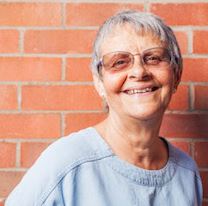Clinicians can transform patients’ perspective on their diagnosis by moving from “there’s nothing we can do” to “research participation is something you can do,” says Wendy Mitchell
That sad look, those haunting words, “there’s nothing we can do . . . ” still trouble me now, some years on. They are a devastating reminder of the damage that can so easily be done when the focus is on the medicalised world instead of the patient’s new world.
I’ve no doubt that continually having to give a diagnosis of dementia can be demoralising for a clinician. After all, there’s been no new drug treatments for over 20 years now. It’s not a “sexy” area to research, though undoubtedly any major breakthrough will win a desired accolade in the history books.
So I can imagine how the clinician feels. They must be sad that there’s nothing they can do for their patient who is expressing their own sadness in a way only they know. But if the clinician feels sad, how do you think the patient feels?
So how about turning this diagnosis around and looking at it from the patient’s perspective? Instead of the sad pitying look and words of “nothing we can do,” how about this instead:
“Yes, the diagnosis is that of dementia and not something anybody would wish to have. But think of it as the start of a different way of living; a way of adapting. I may not be able to offer any treatment but I can offer help and there is still so much you can do, albeit differently and with support.”
Yes, it would take a few more seconds to relay, and the expression would need to change from sad to hopeful, but how different I would have felt if I’d left the room with these words ringing in my ears. The psychological effect of words, facial expressions, and body language should never be underestimated.
If someone in a position of high regard, such as a doctor, looks at us with sadness and states that there is nothing that can be done, we have a tendency to believe them. We go away despondent and believing it to be the end. It doesn’t have to be that way.
Let’s not forget also that there is something clinicians can offer alongside support—and that’s the opportunity to be involved in research.
I know researchers can find it very difficult to find people willing to take part. This may be due to overprotective clinicians, or overprotective family and friends, but may also simply be due to lack of understanding around the meaning of research and what it entails.
As soon as I was diagnosed with dementia I wanted to take part in research—after all, there is no cure and a diagnosis of a progressive, debilitating, terminal illness focuses the mind on the here and now. Being involved in research was a no brainer for me—if you’ll pardon the pun. Being involved helps improve my sense of wellbeing because I know I may be contributing to removing the inevitability that a diagnosis currently brings—this will in turn bring hope to my daughters and other young people.
Without research we can’t change the future. For those of us living with dementia, we need hope and research gives us that hope.
Each month I give a talk about the importance of embracing research to all new NHS staff at the Humber Trust Induction day. The audience is made up of many specialties, from clinical to admin. I say to them:
“You may be sat there thinking, well what’s research got to do with me, it’s not part of my job. But we have to normalise talking about research and to do this we must have every healthcare professional, no matter what their job, to come on board and promote research.”
I also say to them, “If you don’t think research affects you, you may change your mind if you or someone close to you was given that devastating diagnosis of dementia or any devastating diagnosis.”
Social and technological research is equally as important as clinical drug trials, especially for those of us living with dementia now. We have to find the best ways to live and adapt to the disease and we have to find the best ways to care for people who can no longer care for themselves.
We have to normalise talking about research and to do this we must have consultants, GPs, district nurses or occupational therapists, physiotherapists, in fact any healthcare professional all coming on board. To normalise talking about research would normalise involvement.
So the next time any clinician thinks there’s nothing they can do, please think again.
 Wendy Mitchell was diagnosed with young onset dementia on 31 July 2014 at the age of 58 years young. Post diagnosis, she was so shocked by the lack of awareness, both in the community and the clinical world, that she now spends all her time travelling around the country raising awareness and encouraging others to speak out in order to reduce the stigma associated with dementia. She is now proud to be the author of the Sunday Times best seller, Somebody I Used to Know.
Wendy Mitchell was diagnosed with young onset dementia on 31 July 2014 at the age of 58 years young. Post diagnosis, she was so shocked by the lack of awareness, both in the community and the clinical world, that she now spends all her time travelling around the country raising awareness and encouraging others to speak out in order to reduce the stigma associated with dementia. She is now proud to be the author of the Sunday Times best seller, Somebody I Used to Know.
Twitter: @WendyPMitchell
